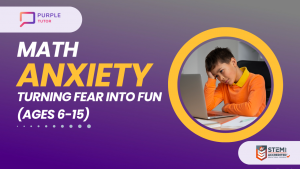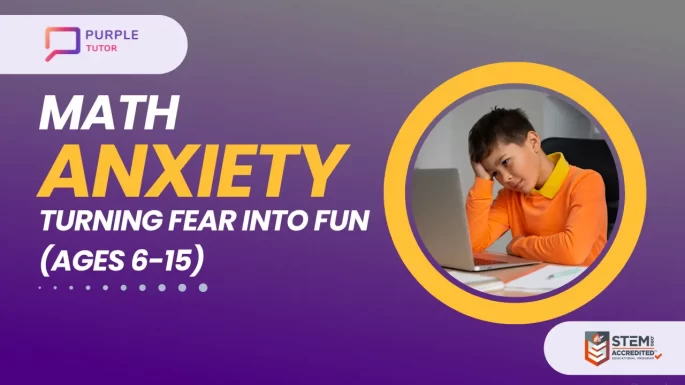 Math anxiety, often known as the fear of math or mathematics anxiety, is a common challenge faced by young learners aged 6-15. In this article, we will delve into the world of math anxiety, its symptoms, and most importantly, how to transform this fear into an enjoyable learning experience. Parents and children alike will discover valuable insights on overcoming math anxiety, ensuring that mathematics becomes a source of fun and confidence.
Math anxiety, often known as the fear of math or mathematics anxiety, is a common challenge faced by young learners aged 6-15. In this article, we will delve into the world of math anxiety, its symptoms, and most importantly, how to transform this fear into an enjoyable learning experience. Parents and children alike will discover valuable insights on overcoming math anxiety, ensuring that mathematics becomes a source of fun and confidence.
Understanding Math Anxiety
Mathematics Anxiety
This is a condition where individuals experience apprehension and fear when dealing with math-related tasks. It can hinder learning and impact one’s overall educational experience.Mathematics anxiety is a prevalent and complex psychological phenomenon that affects individuals of all ages, from students in primary school to professionals in various fields. This condition is characterized by a profound sense of apprehension, tension, and fear when confronted with math-related tasks, concepts, or problems. Understanding math anxiety and its implications is crucial for educators, psychologists, parents, and anyone involved in the world of education or mental health.
Causes of Math Anxiety
Understanding the causes of math anxiety is crucial for educators and psychologists:
- Past Negative Experiences: Negative experiences with math, such as receiving poor grades or criticism, can contribute to math anxiety.
- Pressure to Perform: High expectations from parents, teachers, or peers can create a sense of pressure, intensifying math anxiety.
- Fear of Failure: A fear of making mistakes or failing in math-related tasks can lead to heightened anxiety.
- Lack of Confidence: Low self-confidence in one’s mathematical abilities can perpetuate math anxiety.
Symptoms of Math Anxiety
Recognizing the symptoms is the first step in addressing math anxiety. Common signs include:
- Nervousness: Feeling anxious or tense when faced with math problems.
- Avoidance: Avoiding math-related activities or subjects altogether.
- Physical Symptoms: Experiencing physical discomfort such as sweaty palms or an upset stomach before math-related tasks.
- Negative Self-Talk: Engaging in negative self-talk and believing that one is not capable of succeeding in math.
Overcoming Math Anxiety
Math anxiety can be conquered with the right strategies and support. Here’s how parents and educators can help young learners:
1. Create a Supportive Environment
- Open Communication: Encourage children to express their feelings and concerns about math. Create an open dialogue where they can share their challenges without judgment.
- Positive Reinforcement: Focus on their strengths and efforts rather than just the outcomes. Celebrate small victories to boost confidence.
2. Personalized Learning
- Identify Learning Style: Determine your child’s preferred learning style. Some children thrive through visual aids, while others excel with hands-on activities.
- Tailored Resources: Provide math resources that match their learning style. For visual learners, consider math videos or colorful math books. For tactile learners, use manipulatives like blocks or counters.
3. Practical Math Application
- Math in Daily Life: Show children how math is used in everyday situations, from cooking and shopping to measuring and budgeting. Practical applications make math more relatable.
- Real-World Problem-Solving: Encourage critical thinking by presenting real-world math problems. Discuss potential solutions together.
4. Professional Support
- Tutoring: If math anxiety persists, consider enlisting the help of a math tutor or joining math-focused programs. Professional guidance can provide a confidence boost.
5. PurpleTutor Math Live Classes: A Valuable Resource
Math anxiety can be challenging, but with the right support and resources, it can be conquered. PurpleTutor’s Math Live Classes are a powerful tool in helping children aged 6-15 overcome math anxiety and develop strong math skills.
Benefits of PurpleTutor Math Live Classes:
- Interactive Learning: Engage in live, interactive math classes led by experienced educators.
- Small Class Sizes: Benefit from personalized attention with small class sizes, ensuring that no question goes unanswered.
- Flexibility: Enjoy the convenience of flexible scheduling, accommodating various time zones and busy family schedules.
- Progress Tracking: Monitor your child’s progress with regular assessments and feedback from instructors.
- Boosted Confidence: By gaining a solid foundation in math, students can build confidence in their abilities, transforming math anxiety into math enjoyment.
In conclusion, math anxiety is a common hurdle for young learners aged 6-15, but it can be overcome with patience, understanding, and the right resources. Transforming math anxiety into fun and confidence is achievable through supportive environments, practical applications, and professional guidance like PurpleTutor’s Live Classes. With these strategies and resources at hand, children can embrace math as an enjoyable and empowering journey.
Enroll in the math demo class today and take the first step towards making math enjoyable and accessible. Our commitment to 1:1 classes ensures a thorough grasp of mathematics, while our supportive environment aims to eliminate math anxiety altogether.
Frequently Asked Questions (FAQs)
- Is there a free demo class?A: Yes, PurpleTutor offers a complimentary demo class. Book now to experience it firsthand!
- Can I choose my class schedule?A: Absolutely! We offer flexible scheduling to match your timetable. Pick your preferred day and time.
- What are the fees and charges?A: Discover pricing after a trial class. Discuss your needs with our teachers and counselors for personalized rates.
- Do you follow the school curriculum?A: Yes, we align with your school curriculum, covering it comprehensively. Duration is customized for each student.
- What’s needed for learning with PurpleTutor?A: All you need is a laptop or computer with a webcam and a stable internet connection.
- Are there assessments during the course?A: Yes, we assess students regularly, providing valuable feedback on their performance.
- Do you provide worksheets & practice problems?A: Indeed, we offer grade-specific worksheets and practice problems to enhance conceptual understanding.
- Is after-school & homework support available?A: Yes, our instructors address students’ needs, including after-school and homework support.
- Will you prepare my child for exams?A: Yes, we offer extra sessions to prepare students for exams, ensuring their success.
- What certificates will my child receive?A: Upon course completion, your child will receive a PurpleTutor certificate accredited by STEM.org, a leading STEM education organization in the USA.
- What courses does PurpleTutor offer?A: PurpleTutor provides cutting-edge math courses, and a range of coding courses including Python, Web Development, Machine Learning, Artificial Intelligence, Cyber Security, and more. Visit our courses section or talk to a counselor to learn more. Book your complimentary class today and explore our offerings firsthand.

